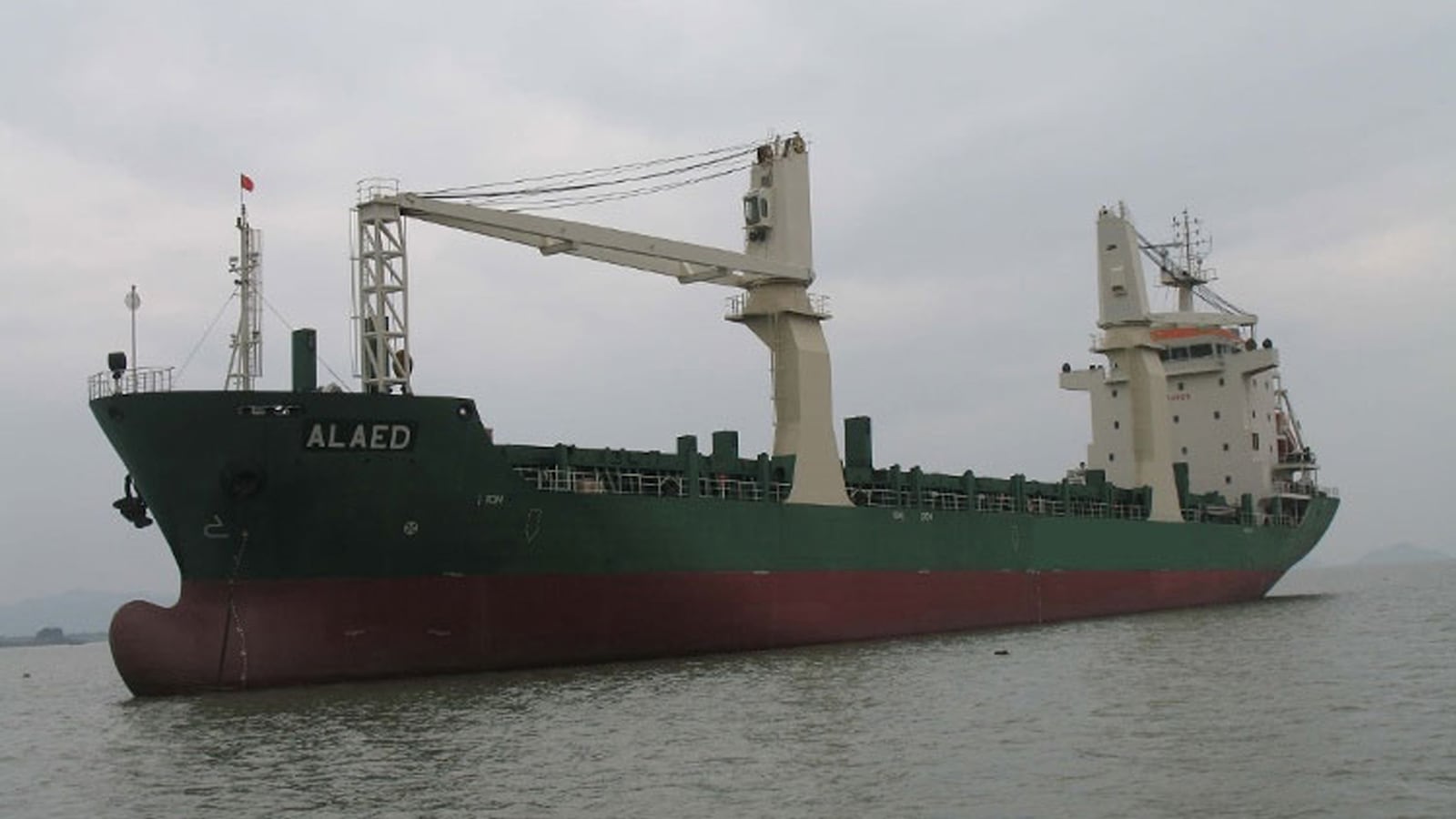Britain has acted to block a shipload of Soviet-era attack helicopters from reaching Syria in the first concrete act of international intervention in the escalating Syrian conflict. On Tuesday, the U.K.-based marine insurer Standard Club canceled all cover for the MV Alaed—a cargo ship that had just collected a shipment of between 12 and 15 Russian-made Mi-25 attack helicopters—as well as all other vessels owned by the Russian shipping company Femco, prompting the ship to turn back to Russia.

The Alaed, which was sitting off the West coast of Scotland, had obtained the helicopters—better known in NATO parlance as Hinds—from the Baltic port of Kaliningrad. The choppers, which had been sold to Syria by Russia in the early 1990s, had been undergoing a refit in Russia.
"We were made aware of the allegations that the Alaed was carrying munitions destined for Syria," the Standard Club said in a statement Tuesday. "We have already informed the ship owner that their insurance cover ceased automatically in view of the nature of the voyage."
The cancellation of the Alaed’s insurance makes her an instant international pariah. It is not illegal to operate uninsured vessels in international waters—but most major ports will not allow vessels without insurance to dock or refuel, and most professional mariners will not work on uninsured ships.
But the withdrawal of insurance amounts to a blanket international sanction on Femco, the Alaed’s Sakhalin-based operator, preventing the company’s whole fleet from doing business until Femco severs its ties with Syria. The British Foreign Office had earlier warned the Standard Club that Femco was in breach of European Union sanctions on military goods to the Syrian regime.
According to Maritime Bulletin, a Bangkok-based merchant-shipping website, the Alaed may have already visited in Syria in May. According to publicly available GPRS shipping data, the Alaed sailed from the Russian Far East port of Nakhodka, transited Suez and called at Gibraltar for refueling on May 2. But the vessel is unaccounted for between that date and June 4, when she arrived in St. Petersburg, usually eight days' sailing time rather than 30, raising the possibility that she may have paid a clandestine visit to Syria. From St. Petersburg on June 4. the Alaed proceeded to the military port of Baltisk, where U.K. authorities say she loaded her cargo of helicopters, and according to her official manifest is now officially en route to Vladivostok.
Russia does not recognize EU sanctions and Foreign Minister Igor Lavrov has defended the delivery of attack helicopters to Syria as "the fulfillment of contracts that were signed and paid for a long time ago … All such contracts are solely for means of air defense." Lavrov told reporters in Tehran last week after talks with Iranian Foreign Minister Ali Akbar Salehi that "we don't supply Syria or anyone else with things that are used to fight against peaceful demonstrators, unlike the United States, which regularly supplies that region with such special equipment.” U.S. Secretary of State Hillary Clinton had earlier blasted Russia for supplying helicopters to the Assad regime that would “escalate the conflict quite dramatically."
Even before news broke of the suspension of the Alaed’s insurance, Russia defiantly announced Monday that it was preparing to send an unspecified number of Marines to the Russian naval base at Tartus, near the Syrian port of Lakatia. Tartus is Russia’s only overseas naval base and, according to satellite photographs available on Google Earth, consists of a small floating jetty and some onshore fuel containers and barracks. Large ships, like Russia’s only aircraft carrier—the Admiral Kuznetsov, which paid a call in March—cannot dock there. Nonetheless, a Russian Navy source told the semiofficial Russian news agency Interfax on Monday that the Black Sea fleet would send two large troop transport vessels and a rescue tugboat to “defend Russian citizens and infrastructure in the port city of Tartus and also evacuate equipment if necessary.”
Lavrov has repeatedly denied that Russia is a backer of the Assad regime. "We have stated many times that Russia is not a defender of the current regime in Damascus and has no political, economic, or other reasons for becoming one," Lavrov wrote last week. But human rights groups have accused Russia of covertly delivering heavy weapons to the Syrian Army, most recently on board the freighter Professor Katsman, which docked at Tartus in May.
Up to eighty percent of the world’s shipping is insured or reinsured in London, according to Lloyds, the biggest marine insurance syndicate in the world. Withdrawal of insurance could, therefore, be a powerful sanction in the hands of the U.K. government, which voiced it determination to stamp out further arms deliveries to Syria. "The foreign secretary made clear to Russian Foreign Minister Lavrov when they met on 14 June that all defense shipments to Syria must stop," said a Foreign Office statement Tuesday. "We are working closely with international partners to ensure that we are doing all we can to stop the Syrian regime's ability to slaughter civilians being reinforced through assistance from other countries."






